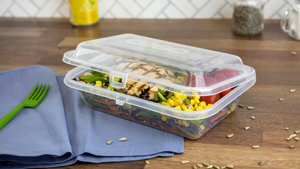Biodegradable plastic marries high gas barrier with water solubility
The new Nichigo G-Polymer material introduced by Soarus LLC (Arlington Heights, IL) brings together an interesting mix of properties typical of both crystalline and amorphous materials in a way that could help it see use in extruded film and injection molded applications as varied as packaging and household power fuel cell systems.
May 1, 2009
The material was first developed by Soarus’ parent company, Nippon Gohsei of Japan. It brings together biodegradability, water solubility at room temperature, and a gas barrier when dry said to be 200 times as strong as that of ethylene vinyl alcohol (EVOH). According to Soarus, it also offers processors a wide processing window.
The material is a high amorphous content vinyl alcohol whose crystallinity can be tailored even to the point of total amorphous character. It can be used in all extrusion processes, reports Soarus, but is said to be particularly suited for oriented film, transparent containers and injection molding. It can be coextruded with other materials, plastics as well as fibers, making possible the development of high-strength, flexible, antistatic, and hydrophilic functional products.
As far as its water solubility, it dissolves rapidly in water, even cold water, with low foaming. Because it is biodegradable, it does not require an antifoaming agent.
Supply is from a semi-commercial facility at Nippon Gohsei’s plant in Kumamoto, Japan, with annual production of 300 tonnes in 2009. There are also commercial production facilities rated for 2000 tonnes/year capacity expected to be ready later this year at its Kumamoto and Mizushima plants, and the parent company already is considering adding production in the U.S. —[email protected]
About the Author(s)
You May Also Like


